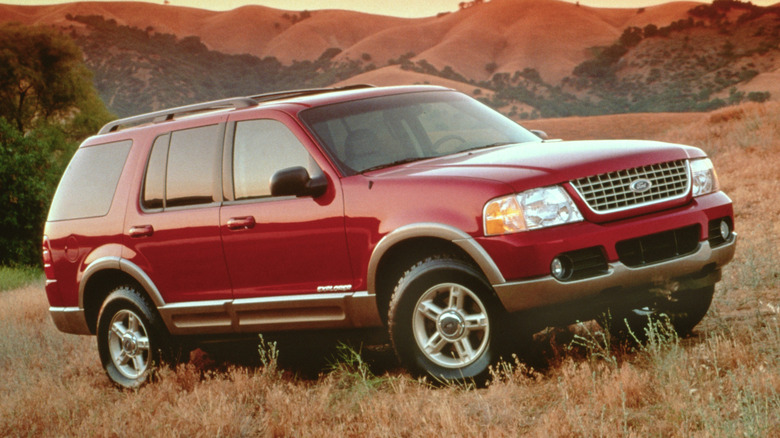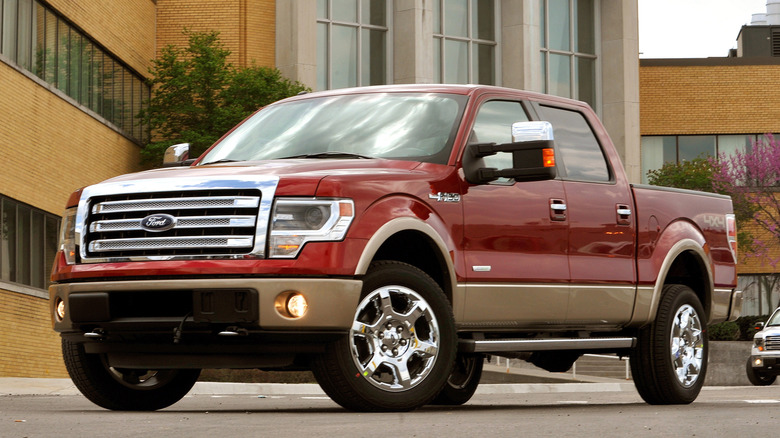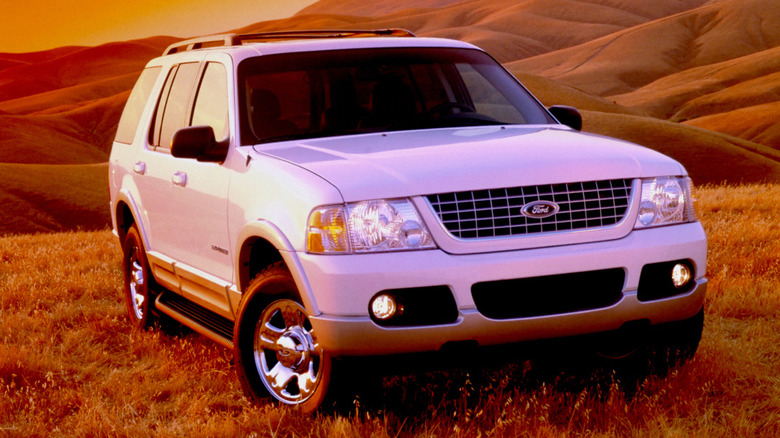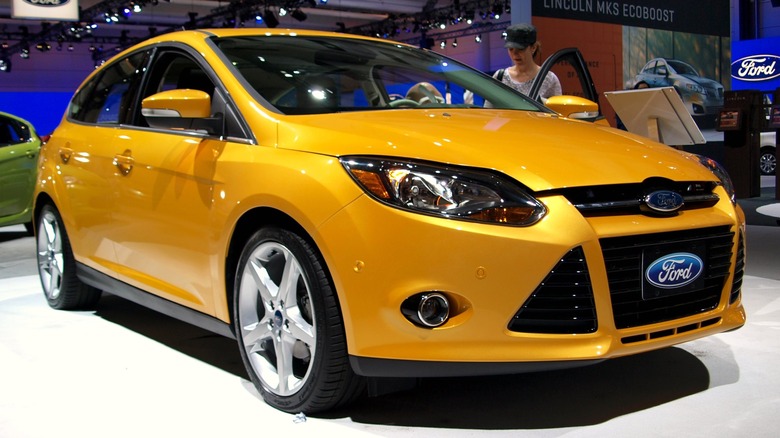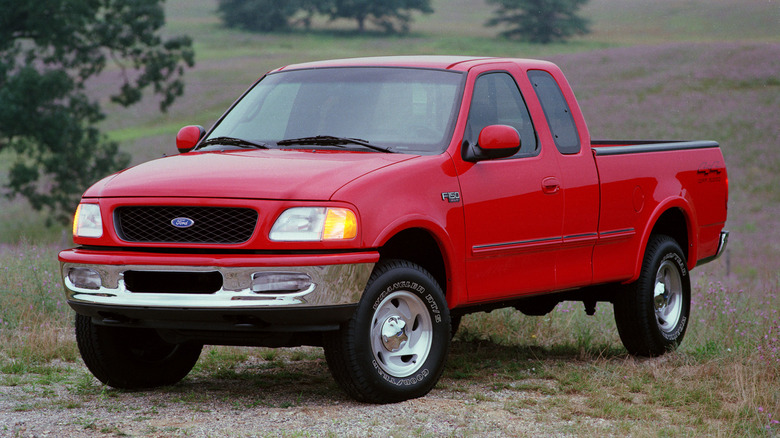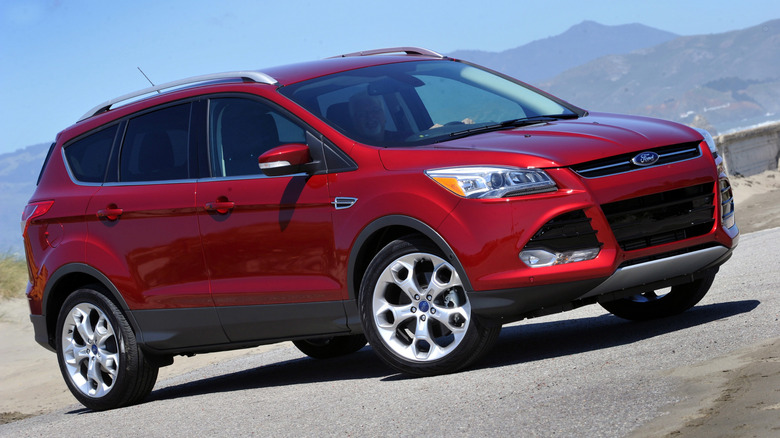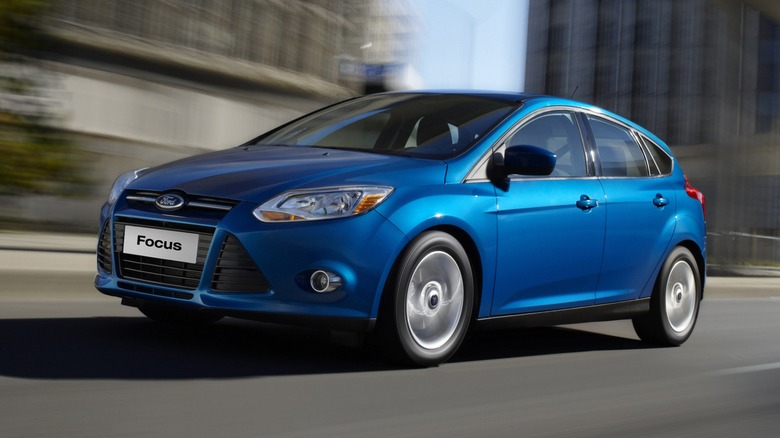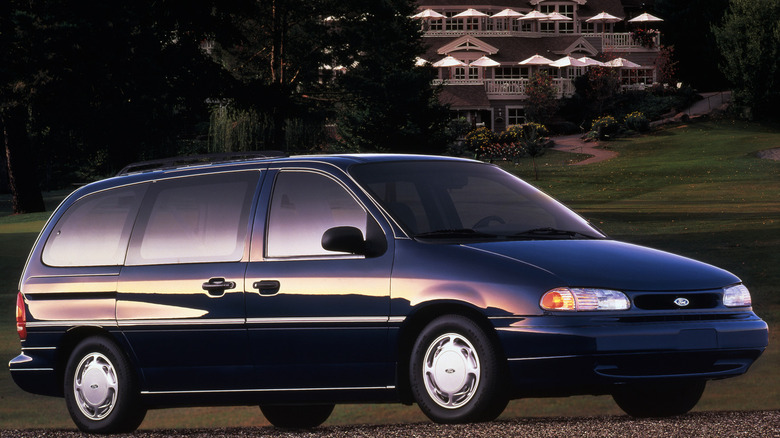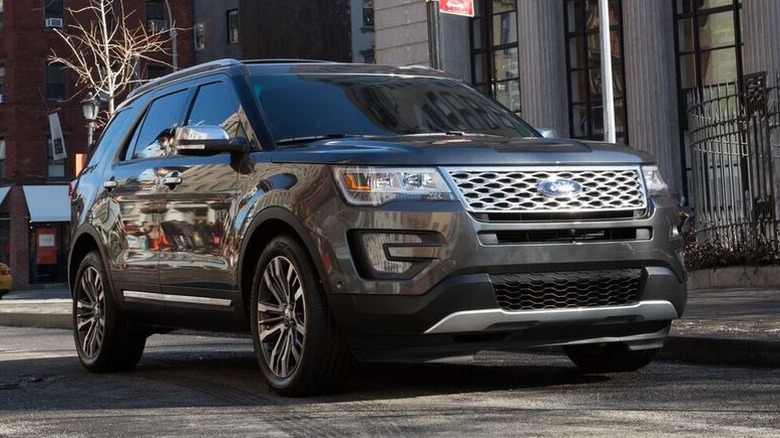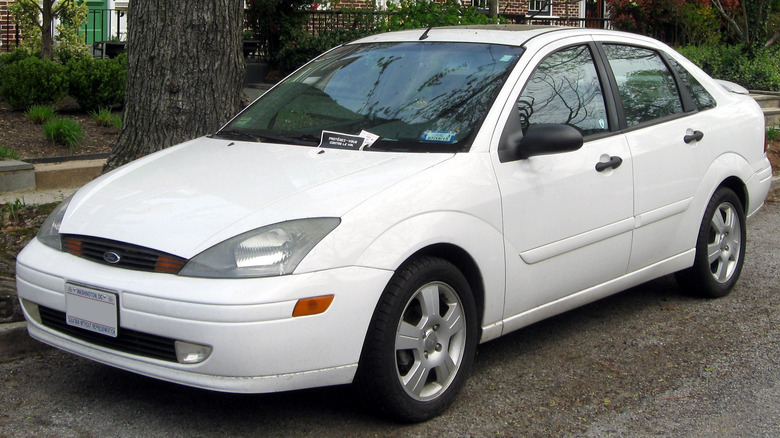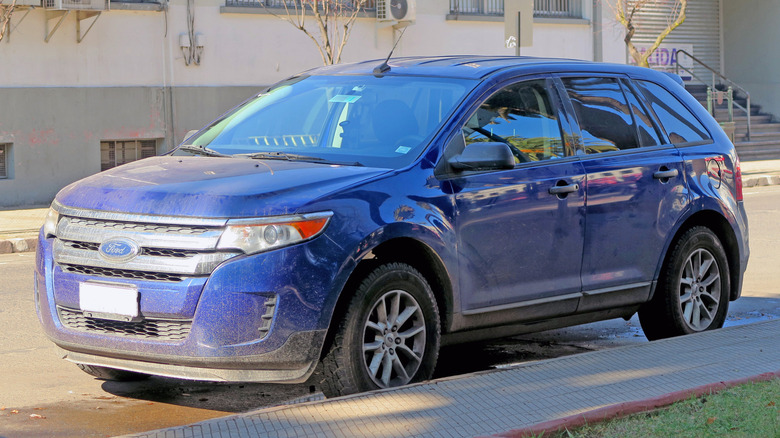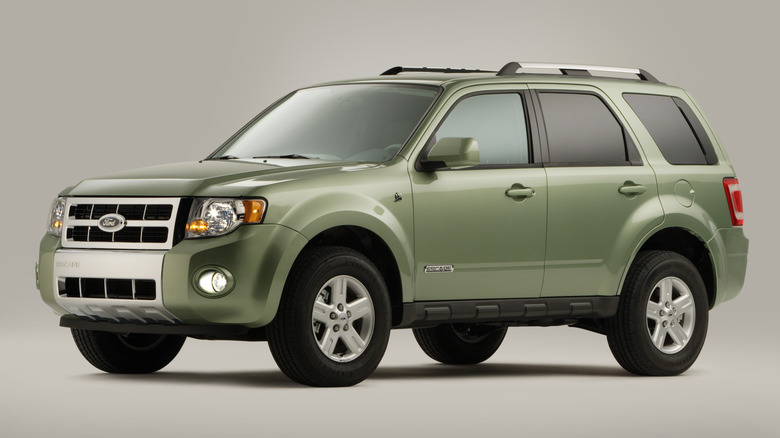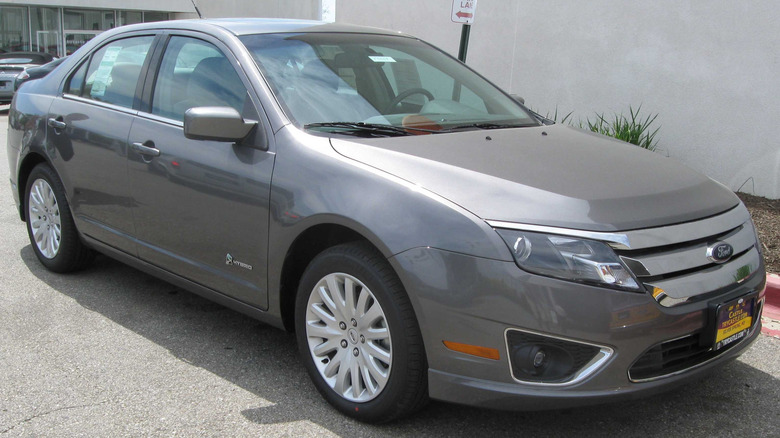12 Used Ford Models You Should Steer Clear Of At All Costs
Ford reportedly sold over two million vehicles in the U.S. in 2024 alone, while its back catalog covers virtually every major segment of the industry. That means that whether you're a buyer looking for a nearly-new car or an older, cheaper runabout, there's likely to be at least one Ford model that's on your shortlist. While many of the automaker's cars remain solid used picks, there are inevitably a few models that fall short of the quality standards that Blue Oval buyers expect.
Some of these models suffered from one major, well-known flaw, while others had a number of smaller issues that, when combined, make for some serious reliability problems. Either way, these problematic models are best avoided when looking for a used car. We've compiled data from the National Highway Traffic Safety Administration (NHTSA) database of recalls, investigations, and owner complaints to put together a non-exhaustive list of particularly poor performers, with each of these models being among the most complained-about Fords to date.
2013 Ford F-150
Just three years after the launch of the 2013 Ford F-150, the NHTSA announced that it was investigating reports of the truck's brakes failing. Ford later addressed that defect by issuing a recall for affected vehicles, but the complaints didn't stop there. Owner complaints continued to pour into the NHTSA, but this time for a different reason. The truck's transmission would unexpectedly shift into first gear, sometimes when the truck was travelling at high speeds. Another investigation followed, and two more recalls were subsequently issued, with the aim of fixing the problem.
However, the NHTSA has continued to receive significant numbers of complaints of the same transmission downshifting issue as recently as April 2025. There could be multiple reasons for the issue, since it's possible that a minority of the trucks affected by the recall didn't end up getting the correct remedial work carried out. Another possibility is that the recall didn't properly address the problem, or that the scope of the recall was too narrow and didn't cover all of the originally affected trucks. For now, it's not clear why these troubling reports continue, but while they persist, it's arguably best to avoid the model year altogether.
2002 Ford Explorer
One of the most infamous model years of the Ford Explorer, the 2002 model's reputation was stained almost as soon as it arrived. The NHTSA opened its first investigation into the vehicles' airbags in December 2001, and although it did not result in a recall, a number of owners have continued to report airbag issues as recently as 2024. However, the most common area of complaint for the 2002 Explorer is its powertrain, and more specifically, its transmission. As of this writing, the car has received more than 1,500 complaints to the NHTSA about its powertrain alone.
The Explorer's suspension is another common area of complaint, as well as various issues with its overall structure. Complaints about the latter often allege that the rear window glass is prone to cracking or shattering, sometimes while the car is parked and unoccupied. If that wasn't enough, other reports also mention issues with the car's accelerator pedal sticking or becoming unresponsive, sun roofs unexpectedly detaching, and the steering seizing while the driver was on the road. With such a wide array of defects, any consistently reliable 2002 Explorer is likely to be the exception rather than the norm, and sellers claiming that their car has run fault-free should be treated with a healthy dose of skepticism.
2012 Ford Focus
Several Focus model years are affected by Ford's notoriously faulty automatic transmissions, with a 2019 lawsuit alleging that the company knew about the faults and continued selling cars to buyers anyway. That lawsuit was eventually settled, but owners of 2012 to 2016 Focus models continue to report issues with their cars. The 2012 Focus, in particular, has a high number of complaints regarding its transmission, as well as various other faults that make it well worth steering clear of.
Hundreds of owners report problems with their cars' electrical systems, with the electric steering system being a particular pain point. Scores of owners have claimed that their Focus' power steering has either seized or become unresponsive while driving. No NHTSA investigation has been launched, and Ford has not launched a recall for the problem, which means any owners with failed steering systems are left to pay for repairs out of their own pockets.
1997 Ford F-150
In a 2023 ranking of every Ford F-Series generation, we previously named the tenth-generation truck that launched in 1997 the worst to date. Part of the reason for that low ranking was the generation's higher rate of recalls and complaints than other generations, with the 1997 model scoring particularly badly.
Owners report a variety of issues, from electrical faults to transmission failures, with a number of reportees alleging that their vehicles caught fire while parked. Some of these fires can be potentially attributed to the failure of the fuel tank strap, for which a recall was issued in 2011. Given that reports of fire and fuel tank detachments have continued in the years following the recall, it seems likely that not all of the affected trucks had the correct recall work carried out.
Problems with the truck's suspension, brakes, and tires have also been reported. Newer model years of the tenth-generation F-150 have recorded lower levels of complaints, and given their age, they won't be much more costly to buy used. That makes the 1997 model in particular worth avoiding.
2013 Ford Escape
In December 2012, as the first owners were just starting to put miles on their freshly delivered 2013 Ford Escapes, the automaker issued a recall because of a defect in the coolant system. The system could leak and either cause the engine to overheat or, in severe cases, start a fire. The recall covered just over 80,000 cars, with Ford promising to reprogram the vehicle's control module to prevent overheating and also check for any signs of leaks. Unfortunately, it seems that the initial recall didn't go far enough.
The NHTSA has recorded over 1,000 complaints regarding engine trouble, with many stemming from coolant leaks. Many of those reports stated that the car was not fixed as repairs were deemed too significant or too costly. A significant number of these reports are recent, but as of this writing, no further investigation or recall has been launched.
However, the car is subject to plenty of other recalls, including a 2012 recall that the NHTSA marks as urgent thanks to the significant potential danger it poses. That recall involves a defective fuel line, which could cause a fire in the engine bay. In total, the 2013 Escape has 17 recall notices recorded by the NHTSA, including recalls for a defective latch that could cause the doors to open while driving, a missing shifter cable bushing that could cause the car to roll away, and incorrect engine wiring that could cause the vehicle to stall.
2014 Ford Focus
The 2014 Focus suffers from the same transmission issues as other models in its generation, and although it hasn't racked up quite as many complaints to the NHTSA as the 2012 model, it's still a poor performer. Having a failure-prone transmission is enough of a reason to stay away from the model by itself, but owners of the 2014 Focus also report several other issues with the car. Like the 2012 model, the 2014 model is known to suffer from steering system issues, with drivers reporting that the steering will become difficult to turn or seize up altogether.
The car was also included in a recall involving a faulty door latch, which affected a number of Ford and Lincoln models built between 2011 and 2016. The recall was issued in 2020 and described how, if the latch broke, the car's doors could potentially open while the owner was driving. Another recall involved the car's canister purge valve, which was liable to break because a previous recall wasn't carried out properly on a significant number of cars. These recalls are just a few of the 12 total recalls issued for the model to date.
1995 Ford Windstar
Few things are more frustrating for car owners than when a problem persists even after multiple attempts to fix it. It's a common theme among owner complaints about the 1995 Ford Windstar — owners would take the car to a dealer or garage, a mechanic would come up with a fix, and then shortly after, the same problem would happen again. In the Windstar's case, most of these problems concerned the engine. Given the age and subsequent resale value of a 1995 Windstar today, it's safe to assume that most owners wouldn't bother with any costly engine fixes. They'd simply write the car off entirely, although a better option is not to buy one in the first place.
Even leaving aside the Windstar's engine woes, it's still far from reliable. The car has been subject to eight recalls since its launch, with the most recent of those being in 2009. An issue was found with the car's speed control deactivation switch, which could cause overheating and potentially vehicle fires, even without the engine running. The recall was wide-ranging and affected a range of popular Ford models built from the late '90s to mid '00s. Combine that with the car's other recalls and its reputation for engine trouble, and the result is a car that's definitely worth avoiding.
2016 Ford Explorer
It can often be the case that the first model year of a new generation of a car can come with some teething troubles. Ford first gave buyers a peek at the 2016 Ford Explorer back at the Los Angeles Auto Show in 2014, and promised new styling, new features, and a new EcoBoost engine. Unfortunately, the automaker also unwittingly shipped the car with more than its fair share of quality control issues, leading to it racking up more than 2,000 complaints with the NHTSA.
Among those complaints, steering failure is frequently listed as the reason for contacting the agency, with some reports alleging that the car lost its power steering without prior warning while on the road. Structural issues were also reported, with Ford issuing two structural recalls for the car in 2024 and 2021. Both recalls concerned parts of the car that could potentially detach while the driver was on the road, the first recall for the roof rails and the second for the A-pillar trim. Some owners have reported taking their cars to dealerships to have the necessary recall work completed, only to be told that the correct part wasn't available.
2000 Ford Focus
One of the worst Focus model years is also the oldest, with the nameplate having been introduced for the 2000 model year. It suffers from a series of issues that make it impossible to recommend as a used pick, including significant trouble with its electrical systems. Large numbers of owners have reported issues with the car's ignition to the NHTSA, as well as issues with the headlights. Hundreds have also flagged up its engine as a failure point, alongside its fuel pump.
If all those problems weren't already enough reason to steer clear of the car, it has also been subject to 18 recalls over its lifespan. It's safe to assume that most of the examples left on the used market will not be in pristine condition, and are unlikely to have any significant paperwork documenting their service history. That makes it extremely difficult to establish whether any used example has had all of its required recall work carried out, yet another reason to look elsewhere for a cheap runabout.
2013 Ford Edge
Electrical defects can mean that a car fails to start or loses power while on the road, but issues with the brakes can mean that drivers are faced with the inability to properly stop their car when driving at speed. The 2013 Ford Edge suffers from both issues, according to complaints lodged with the NHTSA, plus a number of other faults. As of this writing, many of the recent complaints involve the car's brakes, with owners noting a hissing noise coming from their brakes and a sharp reduction in braking power. Multiple reports say mechanics have traced the issue back to a brake booster, but in some cases, the problem has reappeared even after the part has been replaced.
The car's electrical faults are equally concerning, with owners alleging a variety of issues, including persistent warning lights and infotainment system glitches. Many of those reports say that the car's door ajar light remains on at all times, and the NHTSA has previously investigated the issue. The agency spent several months investigating the reports between 2016 and 2017, but ultimately concluded that the fault did not present a safety risk, and so no further action was taken.
2008 Ford Escape
By far the most common complaint about the 2008 Ford Escape is that its steering can stiffen or seize, often with no prior warning. Ford issued a recall regarding the loss of power steering back in 2014 — one of six total recalls for the car — but it seems that a proportion of affected cars were not included in the recall. That has left drivers needing to pay for the cost of repairs themselves, if they decide that it's economical to repair the problem at all.
Even drivers who haven't been stopped in their tracks by the power steering system have had to deal with other issues, including problems with the car's anti-lock braking system (ABS). Some reports have pinned the blame on the car's hydraulic control module, but those same reports note issues with finding a replacement module. Other drivers have called out the car's transmission as being problematic, with some alleging that the vehicle has slipped during shifts or disengaged from gear entirely and rolled away while parked.
2010 Ford Fusion
The Ford with the unfortunate title of being the most complained about to date is the 2010 Fusion, which has seen over 5,000 complaints reported to the NHTSA. The 2011 and 2012 models are also among the worst performers for owner satisfaction, although not quite to the same degree as the 2010 model. The list of problems is a shockingly large one, with reports pointing to problems with everything from the car's steering to its transmission, brakes, and electrical systems.
Among other things, drivers report throttle body failure, ABS issues, power steering failure, and defective airbags. A number of these problems have been acknowledged by Ford and are subject to recalls, but it seems like the recalls haven't been enough to stop reports of further problems from flooding in. With such a consistently poor record and little reason for buyers to pick the Fusion over other, similarly affordable used sedans, it's worth staying well away from the car.
